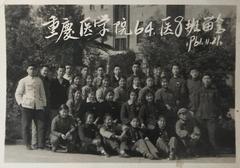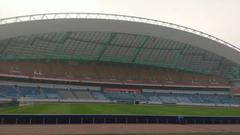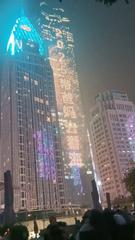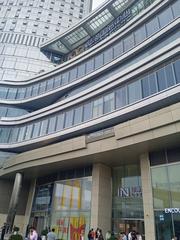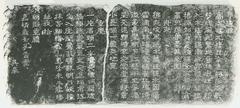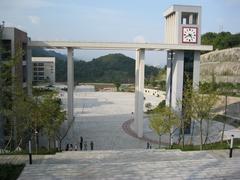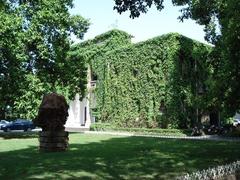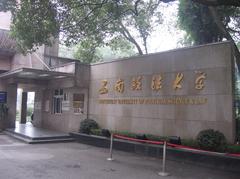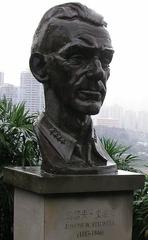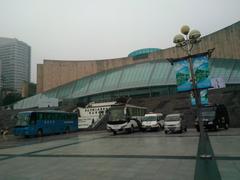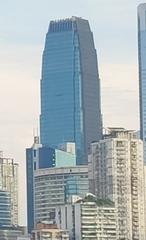Songgai Ancient Town Chongqing: Visiting Hours, Tickets, and Historical Sites Guide
Date: 15/06/2025
Introduction
Nestled along the scenic banks of the Yangtze River in Yongchuan District, Chongqing, Songgai Ancient Town (松溉古镇) offers a captivating journey through centuries of Chinese history and culture. With its origins tracing back to the Ming (1368–1644) and Qing (1644–1912) dynasties, Songgai was once a vital inland port and commercial hub, facilitating trade and cultural exchange throughout southwestern China. Today, its well-preserved stilted houses, ancestral halls, temples, and stone-paved streets stand as enduring testaments to the region’s Ba-Yu heritage and Sichuanese influence.
This comprehensive guide provides everything you need to plan your visit, including Songgai Ancient Town’s visiting hours, ticket information, travel tips, accessibility, and highlights of its historical sites. Whether you’re a history enthusiast or a traveler seeking authentic cultural experiences, Songgai offers an immersive window into Chongqing’s rich past and vibrant present. For official updates and virtual tours, visit the Chongqing Tourism Website and the Songgai Town Tourism Portal. Further details and visitor experiences are also available on platforms like Trip.com and Chinatripedia.
Contents
- Historical Evolution of Songgai Ancient Town
- Architectural Heritage and Main Attractions
- Cultural Significance and Community Life
- Visitor Experience: Practical Tips
- Hours, Tickets, Accessibility
- Local Cuisine and Markets
- FAQ
- Nearby Historic Sites
- Useful Resources
Historical Evolution of Songgai Ancient Town
Songgai’s roots as a crucial trading post along the Yangtze River shaped its development. During the Ming and Qing dynasties, merchants from surrounding regions converged here, trading salt, grain, tea, and more (Trip.com; Chinatripedia). Its riverside dock fostered a vibrant dockside culture, still reflected in the town’s daily rhythms.
The town’s layout—with its narrow, winding stone streets—was designed for both defense and commerce. Despite wars, floods, and modernization, Songgai has preserved much of its historic core, with streets and buildings that evoke its storied past (e-a-a.com; toolack.com).
Architectural Heritage and Main Attractions
Traditional Residential Architecture
Songgai is renowned for its wooden stilted houses (diaojiaolou), grey-tiled roofs, and elaborate carved eaves. Courtyard homes (siheyuan) foster communal living, while pierced corridors with intricate latticework showcase local craftsmanship. Feng shui principles guide building orientation, optimizing light and ventilation (toolack.com).
Key Historical Sites
- Ancient County Yamen: The former government office, with magistrate’s hall, courtrooms, and living quarters, offers a glimpse into ancient administration (Trip.com Songgai Ancient Town).
- Kuixing Pavilion: Dedicated to the deity of literature, this pavilion is a focal point during festivals and offers panoramic town views.
- Luo Family Ancestral Hall: An ornate ancestral hall with tablets and carvings, exemplifying the importance of clan lineage.
- Jade Emperor Temple (Yuhuang Guan): This serene Taoist temple is especially lively during religious festivals.
- Cleansing Temple (Qingjie Si): A Buddhist temple central to Songgai’s spiritual life.
Stone Slab Road and Dock Culture
At the heart of Songgai is a 5-kilometer stone slab road, worn smooth by centuries of foot traffic. The dock culture thrives in riverside teahouses and markets, where traditions of commerce and migration remain vibrant (Trip.com).
Wenzhongba Island
Nearby Wenzhongba Island is the largest sandbank in the upper Yangtze, famous for seasonal landscapes and ancient stone carvings (Chinatripedia).
Cultural Significance and Community Life
Songgai’s vibrant community life centers around festivals, ancestral halls, and bustling markets. Celebrations such as the Spring Festival, Lantern Festival, and Dragon Boat Festival bring processions, folk performances, and communal feasts (chongqingdeeptour.com). The town’s “Three Clears”—clear environment, clear stone roads, and clear river breeze—define its identity (Trip.com).
Intangible cultural heritage thrives in Songgai: Sichuan opera, wood carving, lantern-making, and tea culture are all actively practiced (Chinadragontours.com). The integration of Ba-Yu traditions and Sichuanese influences is evident in daily life, festivals, and local crafts (iChongqing.info).
Visitor Experience: Practical Tips
Visiting Hours
- Songgai Ancient Town: 8:00 AM – 6:00 PM daily
- Some attractions (e.g., Yamen, temples) may have specific hours; check in advance.
Ticket Information
- Town Entrance: Free
- Key Sites: 20–50 RMB per attraction; discounts for students, seniors, and groups
- Tickets available onsite and via online platforms (ruqintravel.com; Trip.com)
Accessibility
- Historic lanes and stone paths may be uneven; wear comfortable shoes.
- Some improvements have been made for mobility, but access can be limited in certain historic areas.
- Public restrooms and bilingual signage are available at main entry points.
Guided Tours
- Local guides provide in-depth history and cultural insights.
- Tours can be arranged through travel agencies, your accommodation, or on arrival.
Best Times to Visit
- Spring (Mar–May) and Autumn (Sep–Nov): Pleasant weather and vibrant festivals (yangtze-river-cruises.com).
Travel to Songgai
- By Car/Taxi: 1.5–2 hours from Chongqing city center
- By Bus: Regular buses from Chongqing to Yongchuan, then local transport to Songgai
- By Train: High-speed trains to Yongchuan, followed by local transfer (Chinatripedia)
Accommodation
- Limited guesthouses and inns in Songgai; more options in Yongchuan or central Chongqing.
- Book in advance during festivals and peak travel periods.
Dining and Markets
- Sample spicy Chongqing hotpot, noodles, and local snacks in historic teahouses and family-run eateries.
- Markets offer bamboo crafts, hand-painted fans, and regional teas (The Tourist Checklist).
Local Customs and Cultural Insights
- Social Etiquette: Respect elders, participate in local ceremonies with sensitivity, and follow customs such as gift-giving (iChongqing.info).
- Photography: Seek permission before photographing people or religious events.
- Festivals: Don’t miss the Lantern Festival, temple fairs, and minority celebrations for a deep dive into local culture.
FAQ
Q: What are Songgai Ancient Town’s visiting hours?
A: 8:00 AM – 6:00 PM daily; check for special hours at particular sites.
Q: How much are tickets?
A: Entry is free; main attractions cost 20–50 RMB.
Q: Are guided tours available?
A: Yes, bookable in advance or on arrival.
Q: What is the best time to visit?
A: Spring and autumn for pleasant weather and festivals.
Q: Is the town accessible for people with mobility challenges?
A: Main areas have some accommodations, but stone paths can be uneven.
Q: How do I get to Songgai Ancient Town from Chongqing?
A: By car/taxi (1.5–2 hours), bus, or high-speed train to Yongchuan then local transport.
Nearby Historical Sites
- Ciqikou Ancient Town: Another well-preserved riverside market town.
- Dazu Rock Carvings: UNESCO World Heritage Site with Buddhist stone carvings.
- Hongya Cave: Iconic riverside complex in downtown Chongqing.
Visitor Resources
- Chongqing Tourism Website
- Official Songgai Town Tourism Portal
- Trip.com Songgai Ancient Town
- Chinatripedia Songgai Guide
- Ruqintravel Chongqing Tickets
Practical Tips
- Language: Mandarin is spoken; local dialects may vary.
- Dress Code: Modest clothing, especially in religious sites.
- Safety: Songgai is safe; use official transport and keep valuables secure.
- Emergency Numbers: Police: 110, Ambulance: 120, Fire: 119
Visuals and Interactive Tools
- High-quality images of Songgai’s main sites (Kuixing Pavilion, Ancient County Yamen, riverside streets)
- Interactive maps available on official tourism sites
- Virtual tours and festival videos for pre-visit exploration
Call to Action
Ready to explore Songgai Ancient Town? Download the Audiala app for guided tours, offline maps, and real-time updates. Connect with us on social media for more travel inspiration and the latest information on Chongqing’s historical sites.
References
- 10 Best Architectural Buildings in Chongqing
- Chongqing Buildings and Architecture
- Monthly Highlights and Must-See Events in Chongqing
- Songgai Ancient Town Guide – Chinatripedia
- Trip.com Songgai Ancient Town Travel Guide
- Chongqing Attraction Tickets and Travel Tips – Ruqintravel
- Chongqing Travel Tips – Yangtze River Cruises
- Chongqing Culture and Cuisine – Chinadragontours.com
- Culture and Customs – iChongqing.info
- Things to Do in Chongqing – The Tourist Checklist

